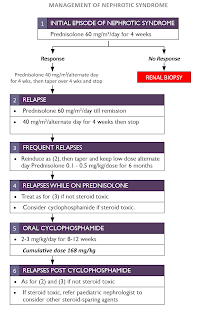Nephrotic Syndrome
Introduction
Nephrotic syndrome is a clinical syndrome of massive proteinuria characterised by
- Oedema
- Hypoalbuminemia of <25 g/L
- Proteinuria >40 mg/m2/hour (>1 g/m2/day) or an early morning urine protein creatinine index of >200 mg/mmol (>3.5 mg/mg)
- Hypercholesterolemia
90% of nephrotic syndrome in children is idiopathic (of unknown cause).
- Secondary causes include post-streptococcal glomerulonephritis, systemic lupus erythematosus (SLE) and Henoch Schonlein Purpura (HSP).
Management
Nonpharmacologic therapy
- A normal protein diet with adequate calories is recommended.
- Sodium restriction - important for control of oedema, hypertension and proteinuria.
Corticosteroids are effective in inducing remission of idiopathic nephrotic syndrome.
- With corticosteroid regimen, 80% of children will achieve remission (defined as urine dipstick trace or nil for 3 consecutive days) within 28 days.
- If the child is steroid toxic (short stature, striae, cataracts, glaucoma, severe cushingoid features), consider steroid-sparing agents, especially cyclophosphamide.
- Paediatric nephrology opinion should be sought for other steroids agents [e.g. levamisole, calcineurin inhibitors (cyclosporin or tacrolimus), mycophenolate mofetil and rituximab].
Oral penicillin V (phenoxymethyl penicillin)
- For prevention of primary bacterial peritonitis, penicillin V 125 mg BD (1-5 years age), 250 mg BD (6-12 years), 500 mg BD (>12 years) is recommended at diagnosis and during relapses, particularly in the presence of gross oedema.
- Human albumin (20-25%) at 0.5-1.0 g/kg may be used with IV frusemide at 1-2 mg/kg to produce a diuresis.
Relapse
Idiopathic nephrotic syndrome has high risk of relapse (>70%).
- A relapse is defined by urine albumin excretion >40 mg/m2/hour or urine dipstick for ≥2+ for 3 consecutive days.
To prevent redevelopment of symptomatic oedema (requiring admission to hospital), it is critical that families are educated about the need to monitor the urine for early detection of proteinuria.
- Every family should know how to perform and record the urine dipstick for protein, have a relapse plan for prednisolone dosing and a sick day plan for prednisolone to prevent relapses with intercurrent infections.
Complications
During an episode, there are significant risks of complications due to hypoperfusion, thrombosis and infection, but with good education and surveillance, many relapses can be detected and treated early prior to clinical deterioration.

Comments
Post a Comment